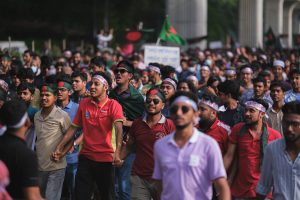A recent wave of protests at Bangladesh’s universities has brought the nation’s attention to two significant issues: the reinstatement of the quota system in government jobs and the introduction of the Prottoy pension scheme. Both have sparked widespread dissent among students and teachers, leading to a series of protests and strikes that have disrupted academic activities across almost all of the country’s public universities.
Student-led demonstrations resurfaced following the Supreme Court’s affirmation in early July of a High Court ruling that reinstated the quota system for government jobs.
Thousands of students from the University of Dhaka, Rajshahi University, Mawlana Bhashani Science and Technology University, Begum Rokeya University, and more took to the streets, blocking major highways to voice their opposition. The students, carrying placards and chanting slogans such as “Let the weapon of 2018 roar again,” “Quota or Merit,” “Students’ action, direct action,” and “No more tears for the meritorious,” demanded the abolishment of the quota system.
The 2018 Bangladesh Quota Reform Movement was a significant event in the country’s history. The movement demanded reforms in policies regarding recruitment in the Bangladesh government. It was initiated by the Bangladesh General Students’ Right Conservation Council (Bangladesh Sadharon Chhatra Odhikar Songrokkhon Parishad), The protests began on February 17, 2018, and had spread country-wide by April 8. The movement rapidly gained popularity among students of different universities and colleges, forcing the government to announce changes in its policy.
Under the existing Bangladesh government recruitment system, 56 percent of entry-level government positions were reserved for specific “entitled” classes: 30 percent for children/grandchildren of 1971 “freedom fighters,” 10 percent for women, 10 percent for districts based on population, 5 percent for ethnic minorities, and 1 percent for people with disabilities. As a result, only 44 percent of job candidates were able to secure positions on the basis of merit, causing discontent among a large section of students. On October 4, 2018, the government issued a circular abolishing all the 56 percent quotas in the public service in the wake of protests by university students and jobseekers demanding reforms to the quota system that had been introduced in 1972.
In a country where a significant number of students remain unemployed after graduation, only 44 percent of candidates for government job exams are selected based on merit. The rest gain entry through the various quotas. Although they have to sit for the exam, they enjoy some special facilities. During a protest on July 8 at the capital’s Shahbag area, some protesters told The Diplomat, “The remaining 44 percent shouldn’t be classified as meritorious; they should also be subject to quotas.”
The students argue that the quota system is discriminatory and hinders merit-based appointments in government jobs. Md. Sahabuddin, a student of Rajshahi University and son of a freedom fighter, told The Daily Star, a Bangladeshi media outlet, “Even being the son of a freedom fighter, I don’t want any quota system. I want this quota movement to be successful.” This sentiment is echoed by many students who believe that the quota system undermines the principles of equality and fairness.
The protests began on July 1 with students from various public universities participating. However, the movement escalated on July 6, when students from Mawlana Bhashani Science and Technology University blocked the Dhaka-Tangail Bangabandhu Bridge highway.
The students’ discontent stemmed from the perceived discrimination and hindrance to merit-based appointments in government jobs due to the quota system. The protests intensified on July 7, with a nationwide blockade program called the “Bangla Blockade,” during which students across the country boycotted classes and exams and blocked major highways and roads in front of educational institutions.
In the meantime, Prime Minister Sheikh Hasina’s stance has changed significantly regarding the student protest compared to the past protest in 2018. Back then, she was more amenable to the students’ demands. She commented, “there is nothing to get angry at, the students are demanding. I totally accept it.” This comment clearly indicated a willingness to consider the students’ requests for reforming the quota system in government jobs. At that time Hasina’s Awami League was enjoying their second consecutive tenure. The 11th general election was held later in 2018.
However, this time Hasina’s tone has changed. She has dismissed the anti-quota movement as unjustified, especially after a court verdict. “Students are wasting their time unnecessarily in the name of the movement. After the verdict of the court, there is no justification for the anti-quota movement,” she said during a greeting exchange program. This statement reflects a firmer stance against the protests, emphasizing the importance of adhering to the judicial process and court decisions.
The difference between her comments in 2018 and 2024 highlights a change from an initial openness to dialogue and reform to a more definitive rejection of the protesters and their demands. In her recent comments, the prime minister also questioned the benefits of abolishing the quota system, pointing out that women and people from remote areas were disadvantaged without it. “This is the reality,” she added, suggesting that the quota system had its merits in ensuring equal opportunities. Her comments in 2024 underscore a commitment to uphold the High Court’s verdict and a call for students to focus on their studies rather than protest.
The unarmed student protesters faced numerous attacks from the Bangladesh Chhatra League (BCL) in 2018 and this year, too. On multiple occasions, BCL activists disrupted gatherings and attacked students who were part of the quota reform movement. For instance, on June 30, 2018 BCL activists reportedly attacked quota demonstrators, thwarting their scheduled press conference. Two days later, on July 2, another attack occurred in the Central Shahid Minar area. These actions led to widespread criticism.
Fast forward to 2024, a fear is still working inside the minds of protesters for the BCL activists as they are already barring students from joining the protest.









































